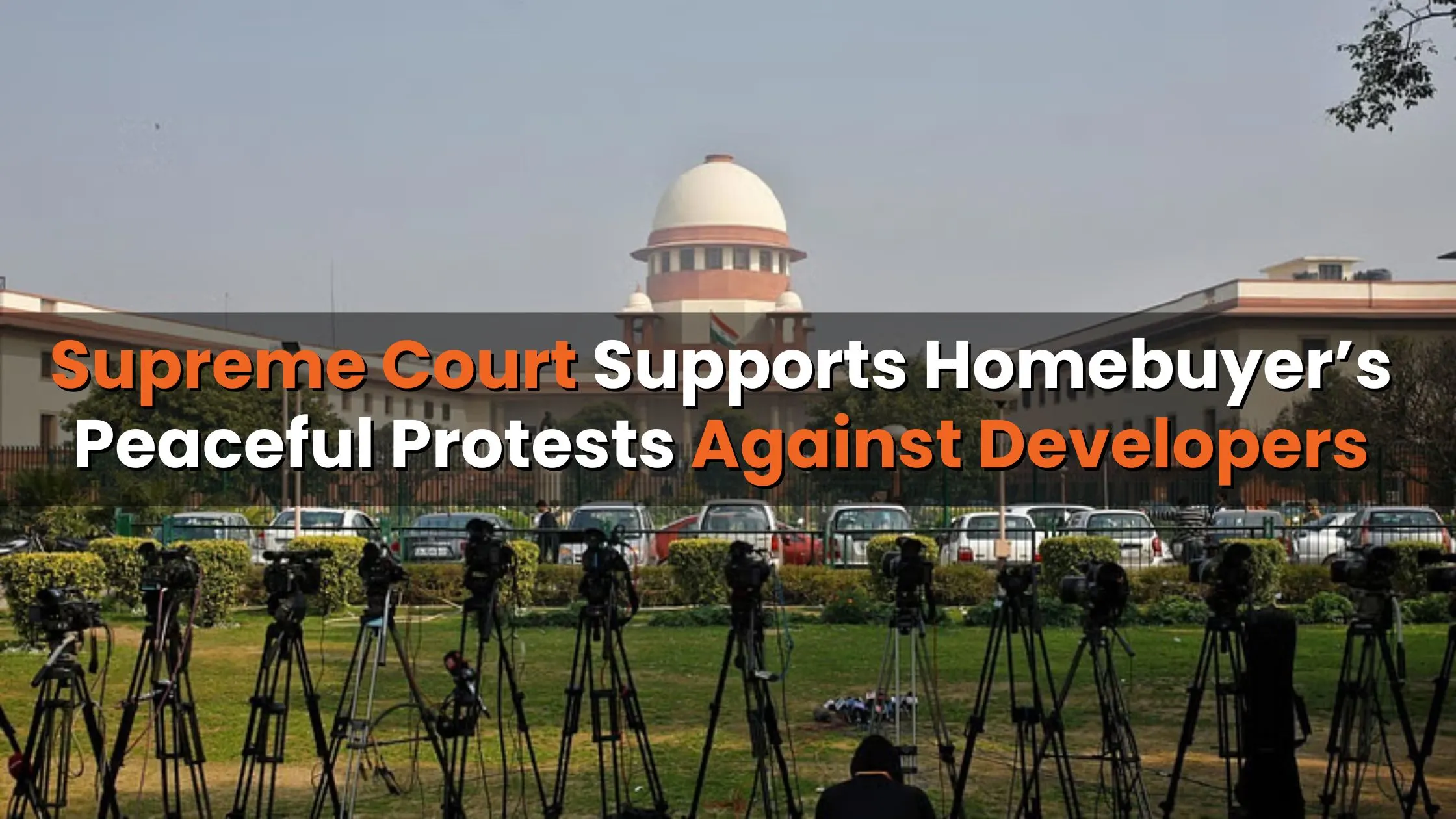Table of Content
▲
In a landmark ruling, the Supreme Court of India has reaffirmed the essential right of homebuyers to peacefully protest against builders in case of grievances. This historic ruling makes it clear that peaceful protest cannot be considered defamation and protects the rights of homebuyers all over India. The judgment highlights the significance of balancing the rights of consumers and builders and reiterates the constitutional right to free speech and peaceful assembly.
Understanding the Supreme Court Verdict
On Thursday, Supreme Court Justices K V Viswanathan and N Kotiswar Singh quashed a criminal defamation case against displeased homebuyers by a builder. These homebuyers had made banners expressing their dissatisfaction, leading to criminal defamation charges against them.
The court found that peaceful protests, which do not use abusive words or defamatory language, are all rights that everyone is entitled to. The bench noted that trying to criminalize these activities is an abuse of the judicial process.
Also Read: Second Trump Tower Unveiled in Gurugram, a First Outside New York
Key Highlights of the Judgment:
- Right to Protest: The Supreme Court established that the right to peaceful protests was part of the rights granted in Article 19(1)(a), (b), and (c) under the Indian Constitution granting freedom of speech, peaceful assembly, and freedom to associate.
- No Defamation: The bench noted that the homebuyers' banners did not contain any defamatory language and there was no allegation of fraud or any misappropriation of any property.
- Abuse of Process: The criminal proceedings against the homebuyers were an abuse of process as the proceedings did not have the necessary ingredients to fit the definition of defamation.
Why This Verdict Matters to Homebuyers
The verdict provides hope to home buyers who often wrestle with delayed possessions, poor building quality, and unfulfilled commitments, and it allows buyers to express their discontent without fear or intimidation unless of course they are not peaceful and lawful about it.
The case illustrates the important balance between builders and home buyers, and the necessity of communication, however difficult, and the ability to express concerns fairly and properly when a dispute arises.
Protesting Peacefully: What Homebuyers Should Know
To ensure protests remain within legal boundaries, homebuyers should adhere to the following guidelines:
- Avoid Offensive Language: Ensure grievances are communicated using polite and professional language.
- Focus on Facts: Stick to factual issues, such as delays or quality concerns, without making unsubstantiated accusations.
- Maintain Order: Conduct protests in an organized and peaceful manner without disrupting public order.
- Document Issues: Keep records of communication with the builder to substantiate grievances.
The Role of Builders in Resolving Grievances
Builders must understand that dealing with homebuyers' complaints quickly and clearly is vital. Complacency about complaints can escalate disputes, to the detriment of reputation and trust. The judgement from the Supreme Court was also a reminder to developers to communicate better and resolve complaints amicably.
Also Read: DLF to Transform Retail with Goa’s Biggest Mall and Plazas in NCR by FY26
Legal Protections for Homebuyers
Homebuyers are protected under various laws in India, such as:
- Real Estate (Regulation and Development) Act (RERA): Ensures transparency and accountability in real estate transactions.
- Consumer Protection Act: Provides a mechanism for resolving disputes related to goods and services.
- Constitutional Rights: Article 19 safeguards free speech and peaceful assembly.
The Supreme Court's decision further strengthens these protections by affirming the legitimacy of peaceful protests.
Conclusion
The Supreme Court’s decision on the right of homebuyers to protest peacefully is momentous and represents a breakthrough in jurisprudence concerning consumer rights. It reinforces the need to protect the interests of homebuyers while ensuring that protests do not transgress the law. This ruling opens the possibility to establish fairer relationships between builders and buyers in India moving forward, through ongoing dialogue and with a foundation of mutual respect.
Follow AquireAcers Whatsapp Channel to Stay Updated With The Latest Real Estate News



_1771224636.webp)



Ans 1. The ruling establishes that homebuyers have the constitutional right to protest peacefully against builders in cases of grievances. It ensures that such protests, if conducted lawfully and without defamatory language, cannot be criminalized.
Ans 2. No, the protection applies only to peaceful and lawful protests. Protests that use abusive language, disrupt public order, or engage in defamatory practices do not fall under the purview of this judgment.
Ans 3. Homebuyers are safeguarded by laws like the Real Estate (Regulation and Development) Act (RERA), the Consumer Protection Act, and constitutional rights under Article 19, which ensures freedom of speech and peaceful assembly.
Ans 4. To keep protests within legal boundaries, homebuyers should: Avoid offensive or defamatory language. Base grievances on factual issues. Maintain order and avoid disrupting public spaces. Document their complaints and communication with builders.
Ans 5. Filing criminal defamation cases against homebuyers for exercising their right to peaceful protest without legitimate grounds is considered an abuse of judicial process, as reaffirmed by the Supreme Court in this case.